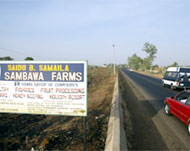Nigeria poultry imports banned
Nigeria’s alarmed neighbours have slapped bans on poultry imports from the West African country in an effort to prevent the deadly H5N1 bird flu virus from spreading across their porous borders.

Niger and Chad, the countries closest to the H5N1 outbreak detected this week in northern Nigeria, Cameroon to the east, and Ghana to the west all announced emergency measures to block the import of Nigerian poultry and poultry products.
But their governments admitted they could be hard pressed to prevent contamination through bustling cross-border trade routes from what is the first reported H5N1 virus case in Africa.
It was found this week in chickens in northern states of Nigeria, where thousands of birds have died.
“Niger is not safe from introduction of this disease,” acting Public Health Minister Hamani Harouna said on Friday after announcing the import ban on all fowl, birds and poultry products, including eggs from Nigeria.
Transfer of poultry and poultry products between regions in Niger was also prohibited.
Human risk
Experts say Africa, the world’s poorest continent where millions live in close contact with chickens and other domestic birds and where health systems are poorly equipped, runs a serious risk of human infection from the disease.
Bird flu has killed at least 88 people and infected 166 since it re-emerged in late 2003.
 |
|
Transfer of poultry between |
Most of the victims have been in east Asia so far.
Niger has a 1500km southern frontier with Nigeria, and Harouna admitted it would be hard to monitor the thriving cross-border commerce between Nigeria’s northern Kano and Kaduna states and the Niger regions of Zinder and Maradi.
Similarly, Cameroon has a 1200km frontier with Nigeria running north from the Atlantic Ocean to Lake Chad, which also forms Chad’s border with Nigeria.
Cameroon authorities also banned imports of Nigerian pork.
“Cameroon is indeed exposed to the risk of bird flu,” director of veterinary services in the Ministry of Livestock, Dr Ahmadou Saidou, told Reuters.
“Our first reaction was to put on the alert all systems and persons in the field, notably at airports, ports, border posts and in markets as well as increased surveillance of migratory birds and national parks,” he added.
Crisis committees
Ghana, which lies to the west of Nigeria after the narrow states of Benin and Togo, also banned imports of poultry and poultry products across its eastern border, following the example of Benin, which took the step this week.
|
“On the whole, I would say that most of the (African) continent is not prepared for it” Prof Barry Schoub, |
Most of the neighbouring countries have formed government crisis committees bringing together experts from the health, agriculture and other ministries to draw up emergency measures to confront the risk of contagion from Nigeria.
But their governments admit they are woefully unequipped to deal with the disease and lack technical resources such as testing laboratories and protective suits and equipment.
They are hoping the international community, fearing the global spread of the virus, will come to their aid with technical and financial assistance and skilled personnel.
“On the whole, I would say that most of the (African) continent is not prepared for it,” Professor Barry Schoub, director of the Johannesburg-based National Institute for Communicable Diseases, told the BBC.
“It’s a threat to the world,” he said.